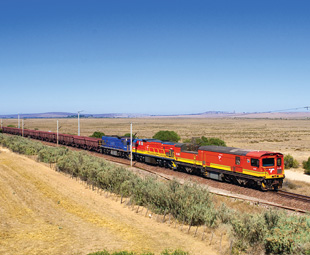Is government protecting rail?

Will the recent announcement by Lucky Montana, CEO of the Passenger Rail Association of South Africa (Prasa), that R3,5 billion is being spent on the purchase of 88 new dual electric diesel passenger/freight locomotives, and government determination that more freight should be transported by rail, lead South Africa back to a regulated transport system to protect rail?
I certainly believe that reintroducing the old permit system (which was abolished in 1993), or reverting back to the old Motor Carriers Act of 1930 (which severely restricted the movement of freight by road in the country), would be highly detrimental to the economy of South Africa. The introduction of any form of legislation that would curtail the free movement of trucking in South Africa, in order to protect rail, would also be devastating to the trucking industry – and many jobs would be lost.
It is my opinion that rail must compete with road freight transport on a level playing field and win business back onto rail by offering customers a more economical, reliable and efficient service. Customers must be able to choose which mode of transport they use to move goods or passengers.
There is no doubt in my mind that there is a need for more of the country’s freight to be transported by rail, especially in the long-haul, high-bulk segments of the business. Many of the containers from our South African ports could be transported by rail – provided that the costs to transport by rail are competitive.
We hope that Montana realises that, in order for South Africa to prosper and for jobs to be created, road and rail need to work together. By working together, and competing fairly for the movement of freight around the country and in the rest of sub-Saharan Africa, we can lower the general cost of transport and make South Africa a more attractive business destination for foreign investors.
With the economic growth of countries north of South Africa there is a growing demand for the transport of freight to these countries. Presently most of the goods being transported north across our borders are being transported by road.
Many of the roads used by the trucks travelling north are in a poor condition. They were not designed for a high volume of heavy traffic and will not last unless money is spent maintaining and upgrading them. Due to the long distances, the growing demand for goods and the poor road infrastructure, upgrading the existing rail system on these routes would be a wise choice.
It is encouraging to see that some large road freight transport companies in the country are talking to Prasa in an endeavour to find a more balanced and more cost-effective system of moving the country’s freight.
As a general rule of thumb, though, long-distance high-bulk transportation of goods is more economically transported by rail, provided that it is reliable, efficient and safe. Therefore, we hope to see rail focusing on this segment of the business and leaving the local logistics to the professional road transport operators.
One of this country’s most respected commercial vehicle industry authorities, VIC OLIVER has been in this industry for 49 years. Before joining the FOCUS team, he spent 15 years with Nissan Diesel (now UD Trucks), 11 years with Busaf and seven years with International.
Published by
Focus on Transport
focusmagsa




